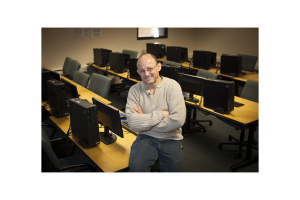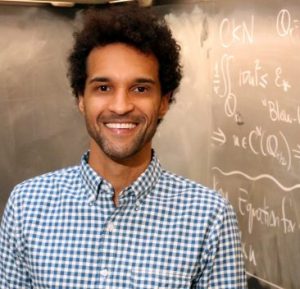Carolyn Sidoti ’19, a Mathematics and Music double major, performed her senior violin recital last weekend. You can read all about it here. Congrats, Carolyn!!
Author: Lucas Waddell
“Problems and Pipelines: A story from the frontline of data science” at noon on Thursday 4/25 in Olin 268
Student Colloquium talk by Professor Patrick McDonald, New College of Florida
Title: Problems and Pipelines: A story from the frontline of data science
Abstract: Suppose you were to suddenly obtain access to a remarkably rich data source, say, a trove of health records. What would you do? In this talk I will sketch how a group at New College handled such a situation. In so doing I will provide you with a glimpse of what it is like to work on a large-scale data science project, paying special attention to the vast array of required skill sets, social constraints and behavior patterns.
“The Dynamics of Continued Fractions” at noon on Thursday 4/11 in Olin 268
Student Colloquium talk by Professor Daniel Visscher, Ithaca College
Title: The Dynamics of Continued Fractions
Abstract: While only rational numbers have a fraction representation, all real numbers have a continued fraction representation. Continued fractions illuminate interesting structure in real numbers, for example, by giving a way to express how close a real number is to being rational. In this talk, we investigate continued fractions from the point of view of a dynamicist, framing the topic in terms of iterating a function and asking questions about how orbits distribute. Multiple flavors of π will be present, and the golden ratio will make approximately 1.618 appearances.
“When is the best time to stop?” at noon on Monday 3/25 in Olin 268
Student Colloquium talk by Professor Ryan Hynd, University of Pennsylvania
Title: When is the best time to stop?
Abstract:Suppose that you are observing a sequence of events, and need to decide when to stop. Your goal could be to maximize an expected gain or give yourself a good chance to make the best choice possible. We will discuss several instances of this type of problem and talk about ways to use math to solve them.
“Mathematics of Outbreaks: Exploring Infectious Disease Transmission and Control with Mathematical Models” at noon on Thursday 3/21 in Olin 268
Student Colloquium talk by Professor Michael A. Robert, University of the Sciences
Title: Mathematics of Outbreaks: Exploring Infectious Disease Transmission and Control with Mathematical Models
Abstract: Mathematical models have long been used to study the spread of infectious diseases. From smallpox to influenza to Zika virus, mathematical models help us understand how infectious diseases spread and how we can potentially control their spread. Models are also powerful tools for making predictions about how infectious diseases may emerge and spread in the future. In this talk, I will introduce mathematical models developed to study infectious diseases, and I will discuss my recent work in using mathematical models to study the spread and control of dengue fever and Zika virus, two diseases transmitted by mosquitoes. Dengue fever is found throughout tropical regions of the world and impacts millions of people each year. In recent years, dengue has begun to spread into more temperate areas of the world. Zika virus first emerged in 2015 and spread rapidly throughout the world, infecting millions of people. The recent rapid spread of both viruses is the result of a number of factors including an increasingly connected world and a rise in global surface temperatures caused by climate change. I will discuss how I utilize mathematical models to understand how these two factors play a role in transmission of dengue and Zika. I will specifically discuss how human movement and temperature variation impact the potential for the spread of dengue and Zika in certain U.S. cities and how the potential for emergence of the viruses may change if global surface temperatures continue to rise. I will also briefly discuss how models are being used to plan control strategies for infectious diseases, including strategies involving the release of genetically modified mosquitoes to help control mosquito-borne diseases.
46th John Steiner Gold Mathematical Competition on March 13, 2019
On March 13, Bucknell will host the 46th Professor John Steiner Gold Mathematical Competition. The competition is open to all area high schools, public and private. Each school may enter up to three students, who will compete for both team and individual prizes. Please see the link below for more details about this year’s competition.
Best of luck to all participants!
John Steiner Gold Exam Announcement
“An Orchestra without a Conductor: The Mathematics of Synchronizing Fireflies” at noon on Thursday 2/28 in Olin 268
Student Colloquium talk by Professor Matthew Mizuhara ’12 of The College of New Jersey
Title: An Orchestra without a Conductor: The Mathematics of Synchronizing Fireflies
Abstract: In Amphawa, Thailand trees are lined with thousands of fireflies spontaneously flashing in near perfect unison. However, there is no “leader” driving this coordination. The Kuramoto model, a non-linear system of differential equations, describes the firefly flashes. Using numerical simulations, we can capture this spontaneous emergence of synchronization and explore other, new patterns which can arise. No background in differential equations is required to enjoy this talk!
Yili Wang ’21 Featured in Bucknell “Cool Class” Video
https://www.facebook.com/266699492339/posts/10157141057037340/
Yili Wang ’21, who is majoring in Applied Mathematical Sciences, is featured in this video about the “Cool Class” DANC 200: Art of Chinese Watersleeve.
“Using Genetic Algorithms for U.S. Army Robot Design” at noon on Thursday 2/14 in Olin 268
Student Colloquium talk by Professor Lucas Waddell of Bucknell University
Title: Using Genetic Algorithms for U.S. Army Robot Design
Abstract: In recent years, Operations Research practitioners have increasingly utilized nature-inspired algorithms (NIAs) to solve real-world, large-scale optimization problems. One of the most popular NIAs is the Genetic Algorithm (GA), which is based on ideas from Darwin’s theory of evolution. This talk will provide an introduction to GAs through the lens of a project that Lucas worked on for the U.S. Army during his time as an Operations Research Analyst at Sandia National Laboratories.
Sports, Statistics and Society
As part of Professor Flynt’s Foundation Seminar titled Sports, Statistics and Society, groups of first-year students acted as consultants, performing sports analytics for different Bucknell athletic teams. Students worked with Baseball, Field Hockey, Men’s and Women’s Basketball, and Football. Each coach developed a set of questions that they were interested in having the students analyze and gave students full access to their team data. The group of students working with the football team worked very closely with Offensive Coordinator, Coach Bobby Acosta, spending time in the football coaching suite, looking at game video, and taking stats for the team up in the box at several practices. Their analysis of practice data helped inform play calling for the offense in the last couple games of the season. The project was featured in this segment during the TV broadcast of the final game versus Fordham on November 17th.




